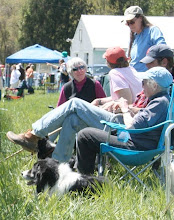
The 32-acre John Tynan Memorial Park is owned by the City of Middletown and offers a variety of walks. Access to the eastern side of Higby Mountain is possible from the entrance on Higby Road.
From the Middletown guide to trails: "Turning north, the trail enters a dense shrub thicket. Then turning west, the trail crosses an intermittent stream and enters forested land, predominantly eastern hemlock. There is a second water crossing at Fall Brook (continue west instead of heading downstream because that path dead-ends).

"At this point, the trail becomes rocky, slopes upward, and then veers slightly south. The trail ends at the intersection of Massa Tom Road, a woods road that connects Country Club Road with the Mount Higby Reservoir service area.

"The crossing at Fall Brook can be difficult, if not impossible, when
the water level rises."
And when the water level is low, scan the stream bed for rocks filled with small holes - vesicles (that's the term for holes) left from when a long ago volcano was active in Connecticut - and left the Swiss-cheesy rock behind as evidence.










